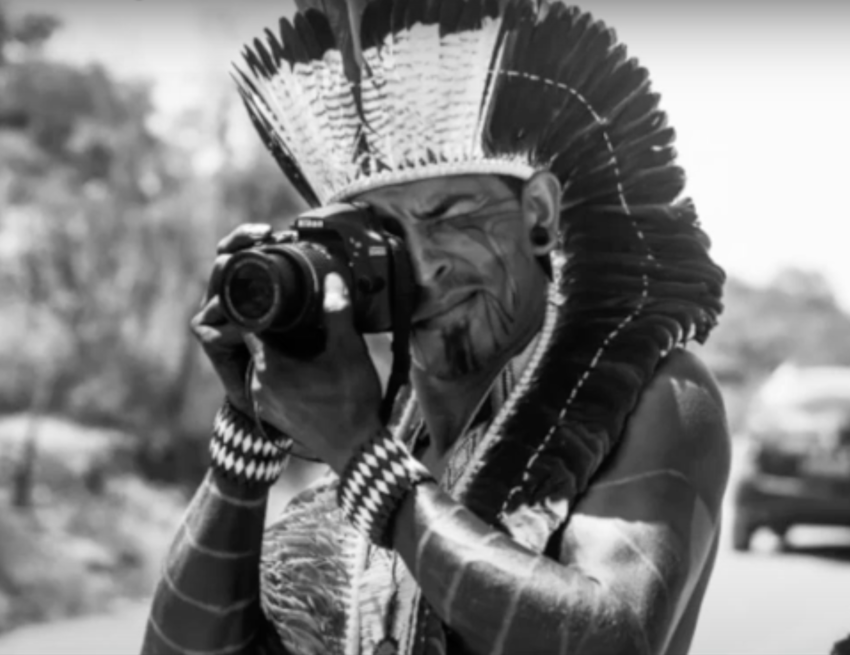Edgar Kanaykõ Xakriabá is one of the artists contributing to Extracting Us , an online exhibition and conversation on the feminist political ecologies of extractivism. In this video he discusses his activist creative practice of ethno-photography and the risks facing Indigenous communities in Brazil.
Transcript
Hello, I am Edgar Kanaykõ, I am an Indigenous person of the Xakriabá people. The Xakriabá people are located in the North of Minas Gerais State, here in Brazil.
I have work, directed towards what I call ethno-photography, which is a way for us, ourselves, as Indigenous people, to be using this tool of audio-visuals, of photography specifically as an instrument of struggle and resistance.
Why struggle and resistance? Exactly because through the image, through photography, we show what we are. Our reality through our own eyes as Indigenous peoples. This for us is a form of resistance exactly because historically our story, our image was always told through the point of view of whites and not from our own perspective. And this brought us many mistruths with this view that came from outside, and my ethno-photographic work is focused exactly based on the realities and perceptions that we as Indigenous peoples are experiencing nowadays here in Brazil.
Considering that one of the main struggles for us, as Indigenous peoples, is the fight for territory. The struggle for territory is fundamental because it is the foundation of what we are. The land, it is, we say, our abode. It is the foundation of our house. For without the land, there are no forests, there are no animals, there are no plants, there’s no food, there are no people, and there are no spirits as well. In other words, everything that is on the land, the territory, and the forest makes up part of what we are. It’s exactly because of this that our main struggle as Indigenous peoples is always guided by, focused primarily on, securing our territories. Our way of seeing the world, our cosmology, our ontology derives from territory. That the land is our mother.
And currently, it’s been an intensified challenge. Seeing as we are living through a pandemic of coronavirus/COVID-19, which is affecting Indigenous peoples directly. For whites, the pandemic could be something new. But for us Indigenous peoples it’s exactly the opposite.
Because our ancestors were decimated due to pandemics brought by the invasion of whites. In the missions, by farmers, by illegal goldminers, and currently, several Indigenous peoples were massacred, decimated historically and until this very day, due to the pandemics having been brought here. And it’s not any different with the new coronavirus. It’s already affecting several Indigenous peoples in Brazil. Principally, here in the North and in the Amazon region.
And so beyond the world that I do in ethno-photography, which is part of the struggle and resistance, linked to our customs, a registry of traditions and cultures and of the struggles of our movements, to guarantee our rights, principally in Brasilia, as part of the national movement of Indigenous peoples.
Today, with this new context of coronavirus, I’m doing work, together with other relatives, not just Xakriabá but other Indigenous relatives of Brazil, that of photography and audio-visuals. It’s a challenge, intensified because we make art, but let’s just say that it’s not art in the context of, I could say, a Eurocentric sense, or to say, how white people think of art. Art for us is exactly life, it is intertwined and you can’t separate it. Just like we don’t separate what is nature from what is culture. This way of separating things is not really linked to the logic of our people in thinking about the world.
And so, it’s also a challenge to make and produce art in this context, but it’s exactly this, how we can use art, also as an instrument of our struggle and resistance, and it’s a little bit of this that we are doing during this current context of the new coronavirus pandemic in Indigenous territories as well. I would like to thank Mary’s invitation to participate here with you and I would like to thank each of you as well, for the space, and I hope that I can contribute to so that our message reaches you, so that you can learn a little about our reality of struggle and resistance of us as Indigenous peoples here in Brazil. Ariante!
Image credit: Edgar Kanaykõ Xakriabá
Translation: Dr Mary Menton
—
Share on Twitter /
Share on Facebook
Posted on September 2, 2020
Categories: Decolonising Art & Culture, Environmental Justice & Activism
Tags: 2020, Edgar Kanaykõ Xakriabá, Extracting Us, Transcripts, University of Brighton, University of Sussex
→ Call for Trustees
← Denilson Baniwa: Doing art on the front lines
